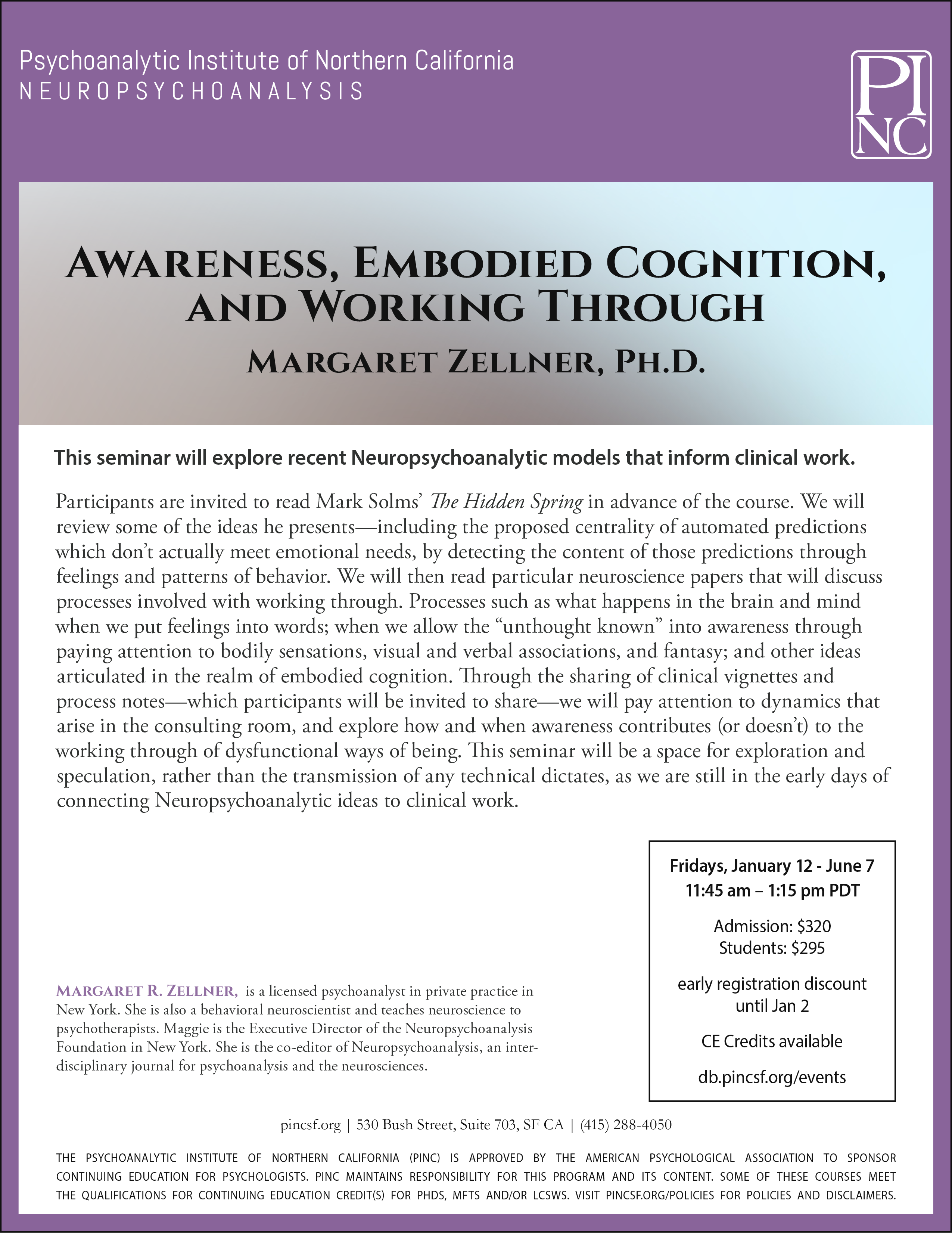Awareness, Embodied Cognition, and Working Through
Margaret Zellner, Ph.D.
Friday Jan 12, 11:45 AM – 1:15 PM, 6 sessions until Jun 7
STARTING DATE POSTPONED until Feb 2
This seminar will explore recent Neuropsychoanalytic models that inform clinical work.
 Participants are invited to read Mark Solms' The Hidden Spring in advance of the course. We will review some of the ideas he presents—including the proposed centrality of automated predictions which don't actually meet emotional needs, by detecting the content of those predictions through feelings and patterns of behavior. We will then read particular neuroscience papers that will discuss processes involved with working through. Processes such as what happens in the brain and mind when we put feelings into words; when we allow the "unthought known" into awareness through paying attention to bodily sensations, visual and verbal associations, and fantasy; and other ideas articulated in the realm of embodied cognition. Through the sharing of clinical vignettes and process notes—which participants will be invited to share—we will pay attention to dynamics that arise in the consulting room, and explore how and when awareness contributes (or doesn't) to the working through of dysfunctional ways of being. This seminar will be a space for exploration and speculation, rather than the transmission of any technical dictates, as we are still in the early days of connecting Neuropsychoanalytic ideas to clinical work.
Participants are invited to read Mark Solms' The Hidden Spring in advance of the course. We will review some of the ideas he presents—including the proposed centrality of automated predictions which don't actually meet emotional needs, by detecting the content of those predictions through feelings and patterns of behavior. We will then read particular neuroscience papers that will discuss processes involved with working through. Processes such as what happens in the brain and mind when we put feelings into words; when we allow the "unthought known" into awareness through paying attention to bodily sensations, visual and verbal associations, and fantasy; and other ideas articulated in the realm of embodied cognition. Through the sharing of clinical vignettes and process notes—which participants will be invited to share—we will pay attention to dynamics that arise in the consulting room, and explore how and when awareness contributes (or doesn't) to the working through of dysfunctional ways of being. This seminar will be a space for exploration and speculation, rather than the transmission of any technical dictates, as we are still in the early days of connecting Neuropsychoanalytic ideas to clinical work.
Dates: January 12, February 2, March 1, April 5, May 3 and June 7
CE Credits offered: 9
Course Objectives
After completing this course participants will be able to:
- Describe the seven emotional systems of the brain.
- Define automated predictions that meet emotional needs of the brain.
- Define automated predications that do not meet emotional needs of the brain.
- Identify the content of automated predications through feelings and patterns of behavior.
- Describe what happens in the brain and mind when feelings are put into words.
- Discuss the concept of embodied cognition and understand its role in informing the clinical process.
- Identify the contribution of bodily awareness in the process of working through patient dysfunctional behavior.
db.pincsf.org/events – 415-288-4050 — 530 Bush St, Suite 703, SF CA USA — pincsf@gmail.com
The Psychoanalytic Institute of Northern California (PINC) is approved by the American Psychological Association to sponsor continuing education for psychologists. PINC maintains responsibility for this program and its content. Visit db.pincsf.org/policies for policies and disclaimers.

